Living Donor Brings “Organ Trail” to The University of Texas at Austin
Living kidney donor cycles the paths kidneys travel from donor to recipient to promote kidney health and living donor awareness
Reviewed by: Mark and Lynn Scotch; Sgt. Ramon Ramos; Nicole Turgeon, MD, FACS
Written by: Ashley Lawrence
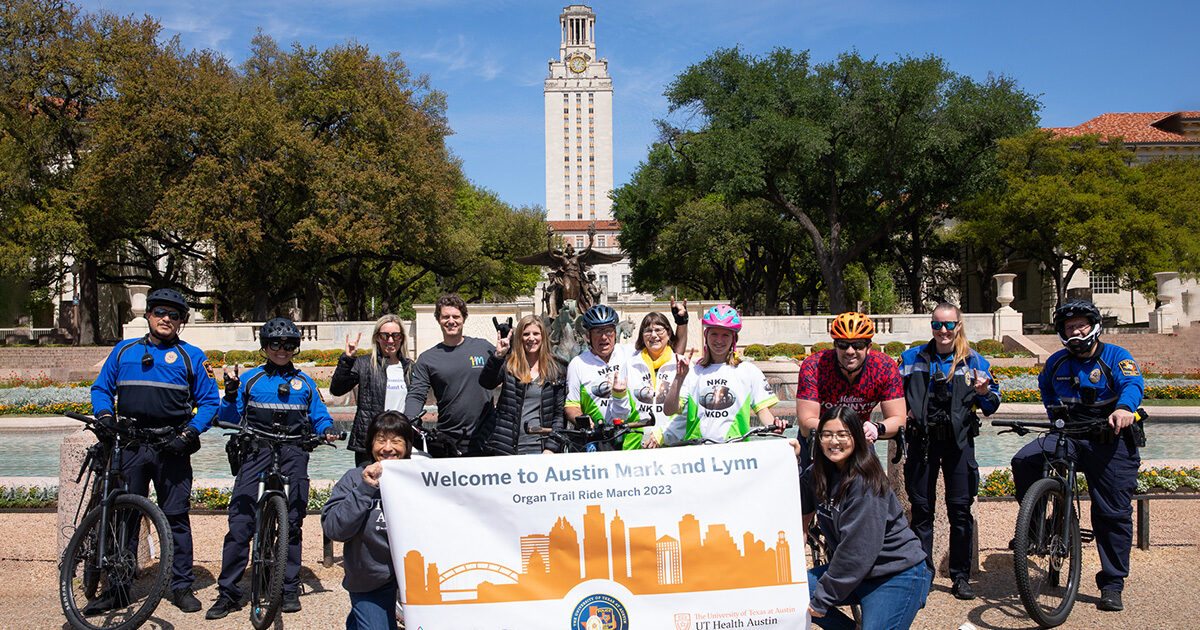
On February 28, 2020, Mark Scotch, a 64-year-old from Wisconsin who retired from a career of selling diagnostic equipment in the paper mill industry, met Hugh Smith, a 56-year-old former professional horse jockey, while on vacation in Hugh’s hometown of Natchitoches, Louisiana. What began as a friendly chat quickly turned into a lifesaving endeavor.
“Hugh and I had just met and were chatting about sports and politics,” explains Mark. “When he got up to leave, I gave him a bit of a hard time about cutting out early. That’s when he told me his kidneys were failing.” Hugh was diagnosed with end-stage renal failure that required him to undergo 10 hours of dialysis every night.
“When he mentioned he was looking for a kidney donor,” continues Mark, “I remembered that my sister-in-law donated her kidney to a high school friend 12 years prior, and I thought, ‘Why not give him one of mine?’”
Transplanting a kidney from a healthy donor into a recipient patient with kidney failure is called living donation. Living kidney donations can come from a donor who is related or unrelated to the kidney recipient. To be considered for living kidney donation, you must first undergo a thorough medical evaluation, which can take up to several months, to determine your candidacy for kidney donation.
Learn more about the Living Kidney Donor Program within the Abdominal Transplant Center.
<br>Once you are considered eligible to become a living kidney donor, you have the option to participate in the National Kidney Registry (NKR) Kidney Paired Donation program, often referred to as paired kidney exchange, to help incompatible pairs of recipients and donors (recipients with an eligible living donor who isn’t a direct match to them) find matches for a kidney transplant. A living donor kidney will go to a recipient and, in turn, their kidney donor, who wasn’t a direct match to them, will donate to another recipient, initiating a chain in which several recipients may receive a living kidney donation.
Learn what inspired Victoria to become an altruistic kidney donor and how that led to a chain in which four recipients were able to receive kidneys from living donors.
<br>Through the NKR Voucher Program, an eligible living kidney donor is able to choose the most convenient time frame for their kidney donation surgery and provide one or more vouchers to people who can then be prioritized to receive a living donor kidney through the NKR if/when they need a transplant. Voucher donation is often referred to as a paired kidney exchange separated in time.
“Without living donors, the waiting times would be much longer than they are,” says UT Heath Austin abdominal transplant surgeon Nicole Turgeon, MD, FACS, who serves as the Transplant Director for the Abdominal Transplant Center, a clinical partnership between Ascension Seton and UT Health Austin. “The NKR Voucher Program makes scheduling surgery more convenient and flexible for the donor, ensures the best matched kidney for the recipient, and is the easiest way to donate.”
Living kidney donation also has the benefit of better outcomes over time. The 3-year survival rate for patients receiving a kidney from a living donor is 94%. Patients who receive kidneys from deceased donors have a 3-year survival rate of 88%. While organ longevity can differ widely by patient, kidneys from living donors can be expected to last an average of 10-13 years, whereas kidneys from deceased donors generally last an average of 7-9 years.
Mark began donor evaluation in July 2020 and was scheduled for donor surgery on September 30, 2020. Mark donated his kidney though the NKR Voucher Program to a compatible recipient in New York, which allowed him to name Hugh as the recipient he wanted to benefit from his donation. Once Hugh was ready to undergo transplantation, he received a living donor kidney on February 18, 2021, from a donor in Southern California.
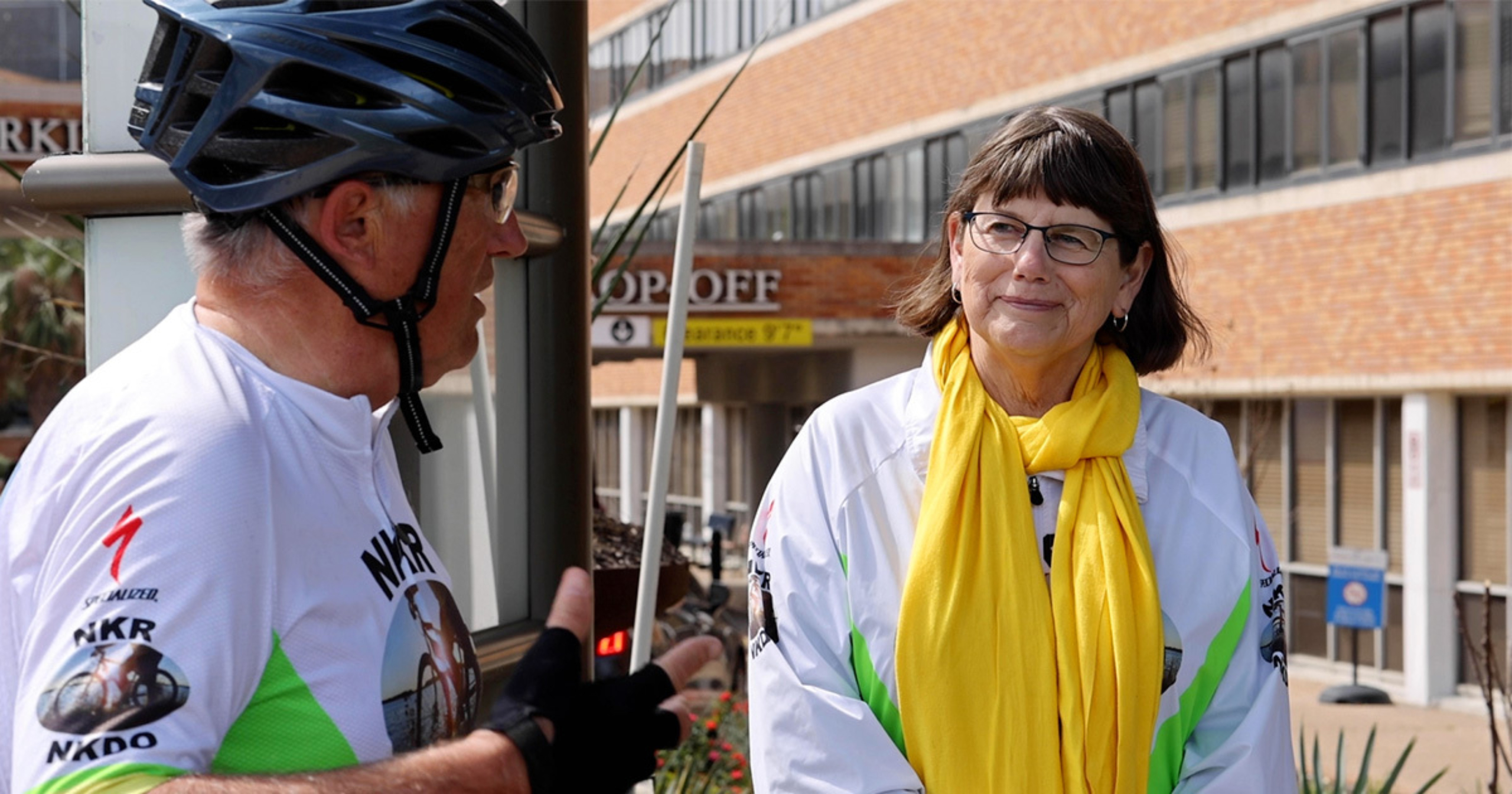
“My wife sat with me through the entire process,” shares Mark. “At the end of it all, she decided there was no reason for her not to donate as well. After two years of COVID-19-related delays, she was finally able to donate this past January.”
Since donating his kidney in 2020, Mark Scotch has cycled the path that kidneys travel throughout the United States in the form of 1,500-mile bike rides to promote kidney health and living donor awareness on what he calls The Organ Trail. While Mark’s wife, Lynn, doesn’t ride a bike, she does drive their support vehicle to ensure Mark gets to his final destination and provide assistance if needed.
“Seven months after my donor surgery, I rode from Wisconsin to Louisiana,” says Mark. “Then, I rode from Massachusetts to Wisconsin. Last spring, I rode from San Diego to Lubbock. My goal is to raise awareness around living kidney donation and to prove that donors can return to their previous level of activity and good health even if that includes vigorously sustained activities.”
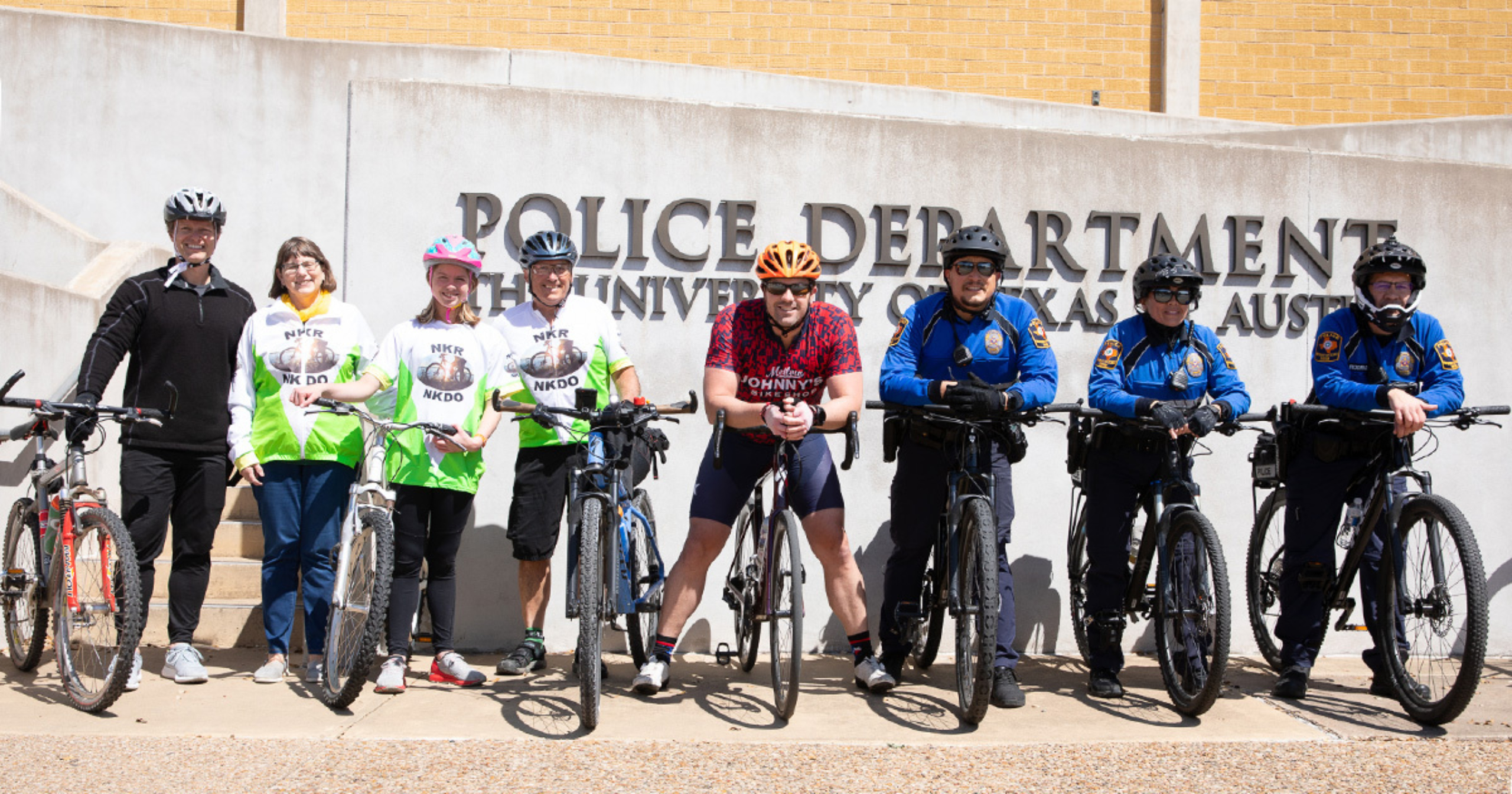
On March 9, 2023, Mark officially set out on his fifth Organ Trail ride that began in Lubbock, Texas and will end in Baton Rouge, Louisiana. He arrived in Austin, Texas on March 19, 2023. That morning, he made his way to The University of Texas at Austin, where he was escorted through campus by The University of Texas at Austin Police Department (UTPD).
“It was a privilege to meet Mark and be able to support the important work he is doing,” shares UTPD Sergeant Roman Ramos. “It also puts into perspective the important job that UT Health Austin providers have as faculty of the Dell Medical School who are responsible for teaching the next generation of healthcare professionals. They play just as integral a role in supporting the success of our Longhorns as we do.”
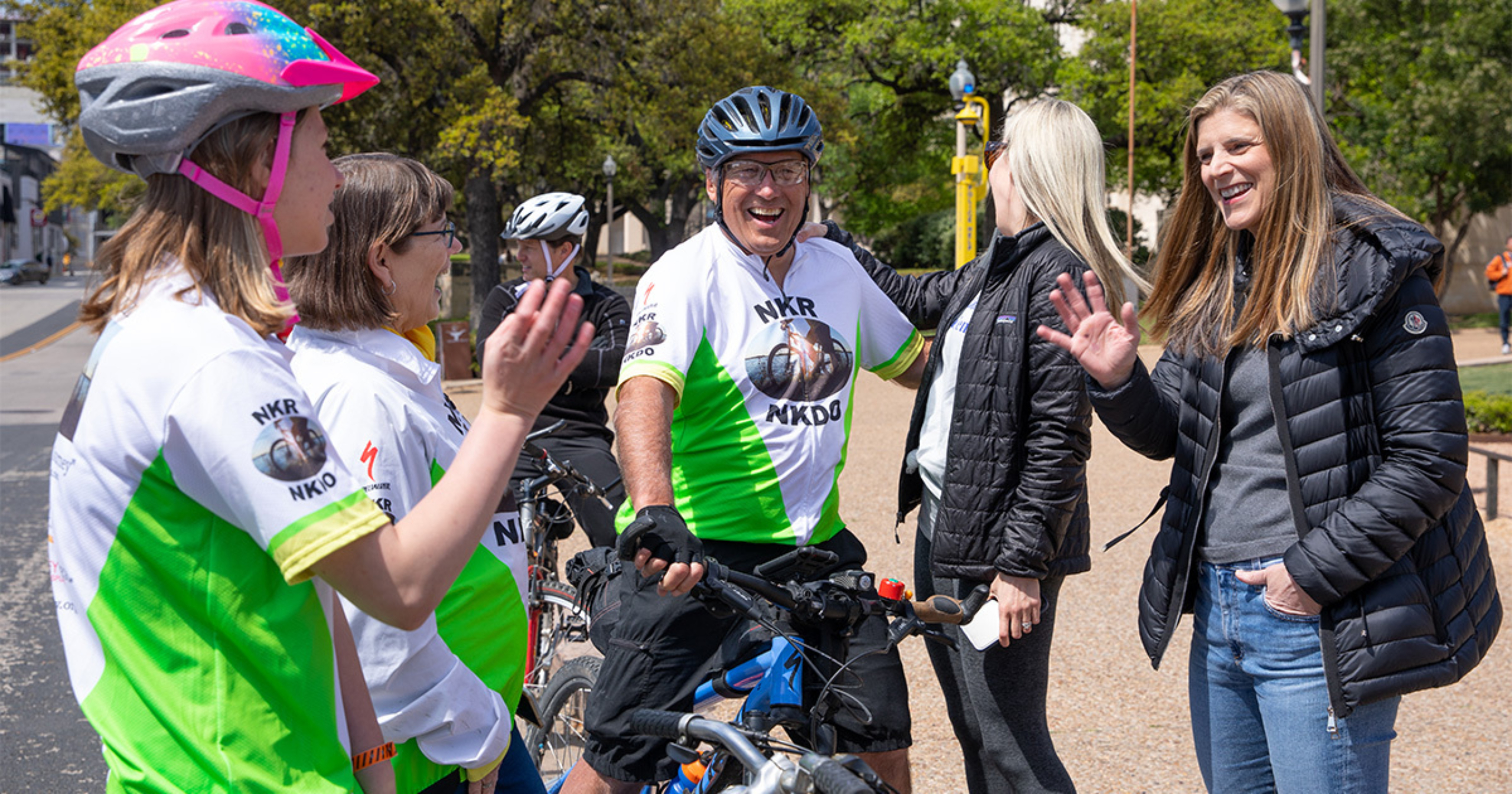
Coordinated and led by Sgt. Ramos, Mark’s ride included stops at the UTPD station and Littlefield Fountain, where he and his wife were welcomed by Dr. Turgeon and various team members from Ascension Seton and UT Health Austin. Mark’s final stop was at Dell Seton Medical Center at The University of Texas, which is where patients of the Abdominal Transplant Center undergo living donor procurement and transplant surgery.
“It’s humbling to meet people like Mark and Lynn who are willing to put themselves in harm’s way to help another person,” shares Dr. Turgeon. “While all my patients inspire me, it’s especially rewarding to experience first-hand the selflessness of living donors who truly want to help transform the lives of someone who is facing a difficult health situation. Because of their generosity, many patients are given a second chance at life.”
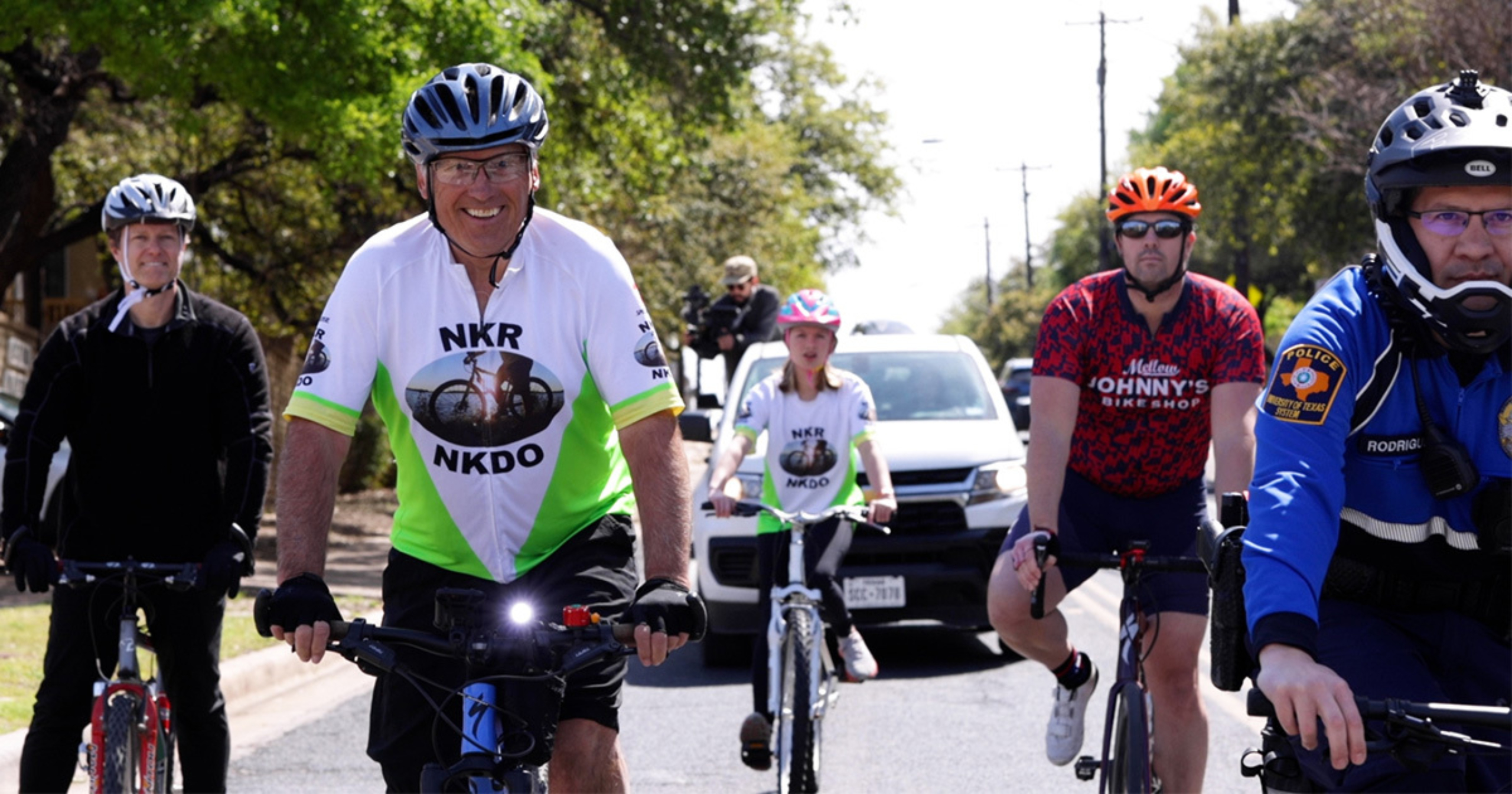
Mark rode alongside Travis Watson, who serves as the Transplant Administrator for the Abdominal Transplant Center, and liver transplant recipient Rowan Sebek from Belton, Texas, who was accompanied by her father Chance Sebek. When Rowan was born, she was diagnosed with biliary atresia, a blockage in the ducts (tubes) that carry bile from the liver to the gallbladder. At just five months old, she received a lifesaving liver transplant. By the time she was 8 years old, she competed in the Transplant Games of America, her first-ever swim race, where she earned second place. Now, as a healthy 12-year-old, Rowan continues to swim competitively. She competed for Team Texas in every swimming event at the 2022 Transplant Games of America this past summer and plans to compete again in 2024.
In addition to its Kidney Transplant Program and Pancreas Transplant Program, the Abdominal Transplant Center intends to expand its services to develop a program for patients in need of a liver transplant.
To be considered for living kidney donation, please complete the online medical screening questionnaire.
For more information about the Abdominal Transplant Center or to schedule an appointment, please call 1-512-324-7930 or visit here.